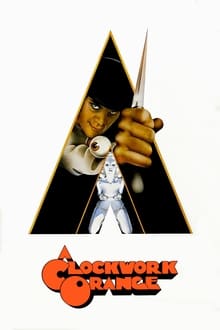
The film is based on Anthony Burgess‘ novel about young Alex Delarge and his droogs who go around tolchocking people and partaking of the ultraviolence and the old in-out-in-out.
Yes, the language is a futuristic mix of Russian, slang and made-up words that Burgess employed so that the futuristic language employed would never sound dated. He called it Nadsat. By the end of the film, for better or worse, you will understand the language.
Note: This may be too detailed for those who have not seen the film, so I advise reading it after a viewing.
Alex likes violence, sex, and Beethoven. He is the leader of a gang (droogs) and in the first part of the film we witness a typical evening: beating up an old veck (derelict, tramp); breaking into the house of a writer and beating him up and forcing him to witness the rape of his wife (in the book it is this writer who coins the term “A Clockwork Orange”), then heading back to the Korova Milkbar.
We are shown Alex’s home: his parents are a rather dull and passive pair. Alex’s bedroom has all the mod-cons, including a pet snake! He also has a state-of-the-art hi-fi on which he listens to his favourite piece of music – Beethoven’s Ninth.
There is dissent in his group’s ranks, to which Alex reacts with violence. However, having asserted his leadership Alex and his droogs go on another evening’s rampage. Alex kills a woman in her house, but is locked in by his vindictive droogs. He is caught and sentenced to 14 years. Two years later, the current Government has promised to do something about the gross prison overcrowding so they employ a new technique that makes the offender feel ill when confronted with violent feelings (the Ludivico Technique). Alex volunteers for the treatment because he will get released after two weeks.
After the two weeks of receiving the treatment we witness a debasing example of its efficacy conducted in front of his old prison warders and chaplain – who is opposed to the treatment on the grounds that it removes people’s free will. Alex is released.
Going home he finds his belongings have been reclaimed by the state, his snake is dead, and his room has been let to a lodger on two-year’s contract. Homeless and with no belongings he meets two of his old droogs who effect their revenge on him. Bloodied, he stumbles across a house and is taken in by the very writer whose wife he raped – and who has since died, attributed by the writer to the rape. Not recognising Alex at first (because they wore masks) he eventually realises who he has taken in and conspires to exact his revenge and at the same time, with the help of his friends, provide ammunition for those who oppose the Government’s scientific methods of rehabilitating prisoners.
Stripped of his ability to defend himself, Alex now has become a victim.
That Alex survives this is no surprise to viewers, considering he is narrating the story; having been nearly killed by his previous victim, the Government has to take action to enforce damage limitation – Alex’s treatment must be reversed. His ability to enjoy violence must be restored.
It’s difficult to view this film in the present day and understand what caused such furore on its original release. There is brutality and rape, but I have seen far worse in mainstream films and by modern standards these scenes are quite tame – and when looked at in the cold light of day there is more suggestion than depiction. I suppose the fact this film is now available on DVD indicates a shift in what is regarded as “acceptable”.
As with all of Stanley Kubrick‘s films, it is a carefully engineered story, the music a mixture of “futuristic” synthesiser courtesy of Walter Carlos (now Wendy Carlos, yes, he had a sex-change) and classical music and “Singin’ in the Rain” – the song Alex sings while the writer’s wife is raped.
It is a well-made film, full of satire and messages about the free-will of people versus the rights of others to be protected; about how far the state should go to rehabilitate, questions about is it even rehabilitation, and the religious arguments stirred up concerning the removal of one’s free will.
There is satire on political machinations and expediency and the love-hate relationship between the press and those in power, how the press can be a weapon against the Government, and its ally. There is a swipe at the fervent belief that God will always provide the answers provided we are patient and wait.
Finally, there is a sideswipe at man’s insistence that Science offers the answer to all things, perhaps the main thrust of the book, and that which gives it its title: “ – The attempt to impose upon man, a creature of growth and capable of sweetness, to ooze juicily at the last round the bearded lips of God, to attempt to impose, I say, laws and conditions appropriate to a mechanical creation, against this I raise my sword-pen —.“
I recommend the film.